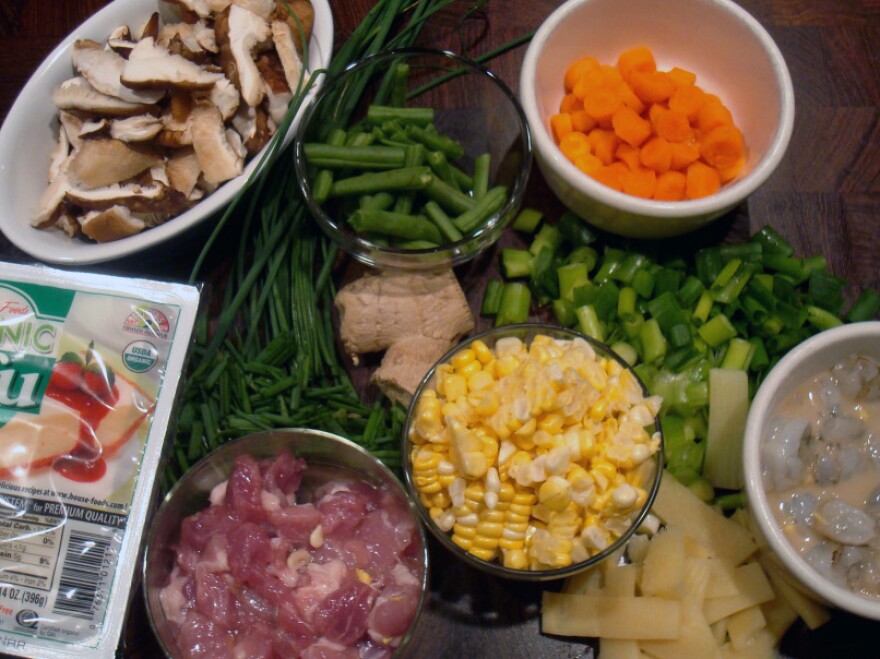We're familiar with fiery Sichuan dishes and Cantonese dim sum, with sweet Peking duck and succulent Shanghai soup dumplings. However, Zhejiang province (Hangzhou is its capital) boasts one of China's eight distinct culinary traditions.
I had to go to China to learn how to cook. I was a Virginia girl with global tastes, studying abroad there while in college. In China, I learned the power of hot oil, minced scallions or garlic and ginger in the wok. With that base, I could transform any vegetables or meats into a satisfying stir-fry.
In China, I also developed an abiding devotion to farmers markets, where I shopped regularly for fresh-picked produce, homemade tofu and still-swimming seafood. And I loved the country's communal style of eating, where everyone stuffs dumplings together and dips their chopsticks into shared dishes in the middle of the table.
My semester studying in Hangzhou, just southwest of Shanghai, revolved around food. Yet, although I learned the basics during my stay there, I never attempted the elaborate classics of this region's cuisine, which is celebrated in China but practically unheard of in the West.
We're familiar with fiery Sichuan dishes and Cantonese dim sum, with sweet Peking duck and succulent Shanghai soup dumplings. However, Zhejiang province (Hangzhou is its capital) boasts one of China's eight distinct culinary traditions. It's home to famous Chinese products: Longjing (or Dragon Well) green tea, Shaoxing rice wine and dry-cured Jinhua ham. The cuisine emphasizes fresh seafood and produce (think bamboo shoots), cooked in subtle sauces with mellow flavors. The goal is to accentuate, not overpower, a dish's leading ingredient.

I set out to master Hangzhou cookery, as I returned to China in August -- my first trip back in almost 10 years. Well, "master" might be an overstatement. I still didn't tackle the city's signature dishes, painstakingly prepared for banquets and at restaurants. As a tourist, you regularly encounter these dishes: the gelatinous dongpo rou (braised pork belly), jiaohua ji (beggar's chicken, wrapped in lotus leaf and baked in clay) and xi hu cu yu (sweet and sour West Lake carp).
Instead, I went in search of the everyday meals Hangzhou people make at home. So I asked spunky Hangzhou TV chef Chen Leilei (whose show name is Cheng Cheng Ma) to be my guide. Her poised 13-year-old daughter and sous chef Shao Yulan (known on TV as Cheng Cheng), joined us. The duo co-authored a children's cookbook, and they regularly film programs together. Chen also collaborated with celebrity chef Martin Yan on a television series he aired in China.
Chen and I met one afternoon at her local wet market, the open-air venues where the Chinese buy their fresh produce and cleaved-to-order meat. After shopping, she welcomed me into her surprisingly spacious, sealed-off kitchen, where Chen and Yulan whipped up an army of dishes. The air conditioning was intentionally turned off, though August in Hangzhou is sweltering. Chen likes to sweat when she cooks.
Soon enough, a group of us gathered around the table for one of those communal feasts. There were Chinese five-spice boiled peanuts, fried bean curd skin rolls dipped in ketchup, tangy sweet-and-sour pieces of a silvery fish, jellyfish marinated with fresh bamboo shoots, organic since they came from a friend's farm. The rice was organic, too, grown on Chen's father-in-law's farm in nearby Ningbo. In a country still tainted by food scandals, that's the only kind of organic certification she trusts.
Most memorable was a dish of whole crab fried with sticky rice cakes, or nian gao. (But cutting up live crab, I've since learned, makes me squeamish. If you insist on trying the recipe, see my blog.)
A traditional veggie-laden tofu soup Chen made was even more delicious and, thankfully, easy to prepare. So is her accessible, vegetarian version of dongpo rou, using winter melon instead of fatty pork belly.
Chen, like most Chinese chefs, tends to eschew precise measurements. I saw no measuring spoons or cups in her kitchen. She and her daughter were adamant that recipes be adjusted to suit personal taste. I’ve tried to approximate quantities of ingredients. But feel free to experiment, to make things more salty, sour or sweet.
Speaking of sweet, I'm not that enamored with Chinese desserts. Don't even get me started on their spongy, buttercream-less cakes. I'm thankful most meals there end with a plate of juicy watermelon instead. However, I am still craving an ice cream-like peanut smoothie like the one we savored at the laid-back but excellent Green Tea Restaurant, nestled next to verdant hills where Hangzhou's famous Longjing tea is grown. We ate spoonfuls of the addictive smoothie throughout our surprisingly spicy (for Hangzhou) meal, and had some left to drink up for dessert.
My globetrotting professor Liu Wei, who taught me that semester abroad, thinks French is the world's best cuisine. But Hangzhou is by far his favorite Chinese cooking style. As we dined together on this recent trip, he waxed poetic about Hangzhou's variety of light, not deep-fried and filling, main dishes. Now I'm adding these mild recipes to my repertoire back home. What's especially nice is that they don't require a pantry full of exotic spices and condiments to prepare.
The author thanks Amy Saurer, resident director of the CET/C.V. Starr-Middlebury College program in Hangzhou and Zheng Cao of Oregon State University for translation and other assistance with this piece.
Copyright 2023 NPR. To see more, visit https://www.npr.org. 9(MDM3NjYwMjA5MDE1MjA1MzQ1NDk1N2ZmZQ004))


